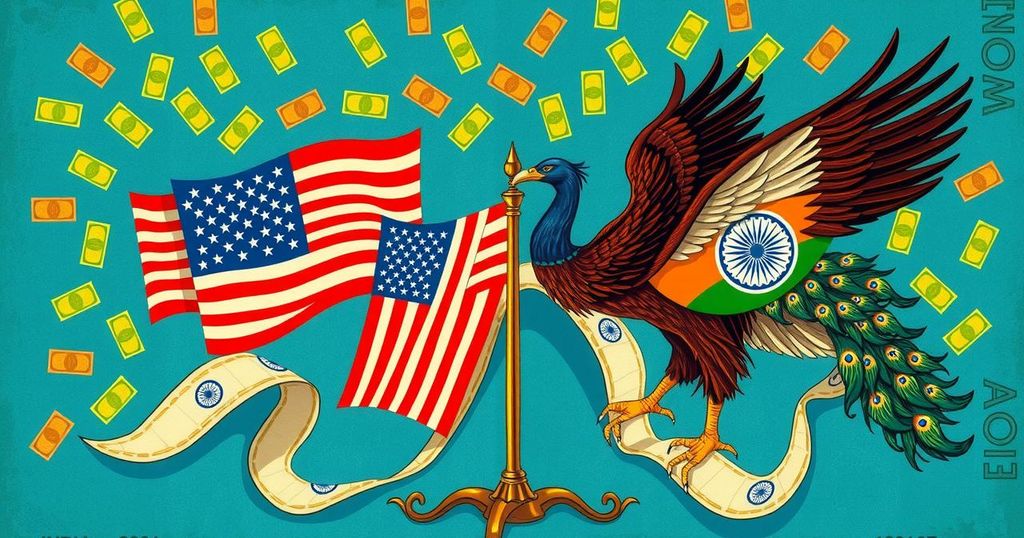Business
economics
Technology
ALPHABET INC, ANDY MUKHERJEE, ASIA, CHINA, DONALD TRUMP, ECONOMICS, ECONOMY, EUROPE, FACEBOOK, FRANCE, INDIA, IRELAND, META PLATFORMS INC, MEXICO, MOD, NA, NARENDRA MODI, NATIONAL SECURITY, NEW DELHI, NORTH AMERICA, OECD, REGULATION, TARIFFS, TRADE, UK, UNITED STATES, US, WHITE HOUSE
Jamal Walker
0 Comments
India’s Google Tax Rollback: A Strategic Gesture Ahead of U.S. Tariffs
India has repealed a 6% tax on foreign digital advertising, known as the ‘Google Tax,’ in an effort to reduce tensions with the Trump administration ahead of upcoming tariffs. This decision intends to demonstrate India’s commitment to accommodating U.S. businesses while addressing local advertisers’ burdens. The broader implications of this shift include potential reforms in India’s consumption tax structure and ongoing trade negotiations.
India’s recent decision to abolish a 6% tax on advertisements from foreign digital platforms, referred to as the “Google Tax,” aims to alleviate tensions with the Trump administration ahead of potential tariffs set for April 2. Prime Minister Narendra Modi’s administration is keen to demonstrate its openness to foreign businesses, signaling to U.S. President Trump, “Look, we aren’t China,” in hopes of avoiding severe economic repercussions.
The tax, initially introduced in 2016, had shifted the financial burden from tech companies to local advertisers, thereby increasing costs for Indian businesses reliant on platforms like Google and Facebook. This situation reflects a broader global challenge regarding big tech companies evading fair taxation. As the tax accumulated roughly $500 million a year for India, advertisers gradually absorbed the additional costs, indicating a resigned acceptance of this levy.
Despite the tax’s cancellation, previous measures, such as the introduction of a 2% levy on e-commerce purchases from foreign platforms, showed India’s resistant stance during prior negotiations. India has been cautious in addressing U.S. concerns, particularly concerning its tax structures, which include a 28% value-added tax (VAT). This rate poses a potential non-tariff barrier that the Trump administration has targeted for negotiation.
Nevertheless, to effectively modify VAT rates in trade discussions with the United States, India must secure cooperation from its 28 states, complicating the reformation process. President Trump has previously applied tariffs, emphasizing a strategy of negotiating trade practices. Recent developments highlight India’s intent to avoid being isolated from punitive tariffs while ensuring its trade framework aligns more closely with U.S. standards.
India’s eagerness to engage with American interests is epitomized by its outreach to firms like Tesla and SpaceX, potentially further coaxing U.S. investors with lucrative deals and regulatory approvals. In return, India seeks to negotiate reduced tariffs while securing higher limits that protect its agricultural sector and economically vulnerable groups.
As negotiations unfold, the Indian government must balance potential revenue losses against the needs of a financially strained middle class. Revamping its consumption tax structure not only aims to satisfy U.S. demands but also paves the way for economic alleviation among advertisers in a challenging financial landscape.
In summary, India’s withdrawal of the “Google Tax” serves as a strategic move to appease the Trump administration and mitigate the risk of punitive tariffs. While this decision reflects a willingness to foster better trade relations, India faces the challenge of adjusting its complex tax systems amidst ongoing negotiations. Additionally, the implications of such changes could enhance the operational environment for local advertisers and promote a more favorable investment climate as India seeks to align its economic practices with U.S. standards.
Original Source: www.business-standard.com




Post Comment